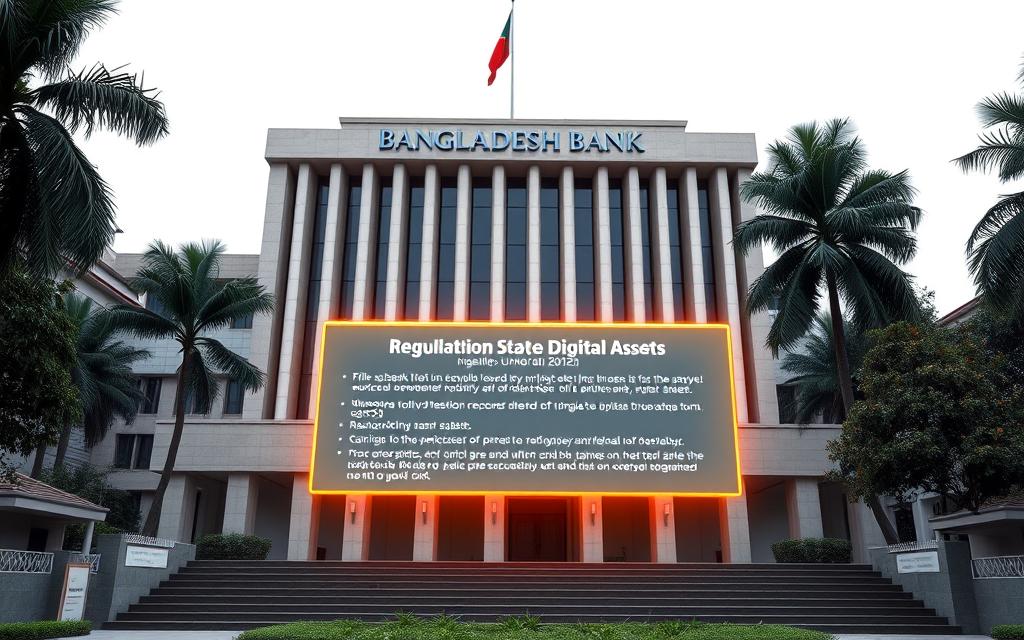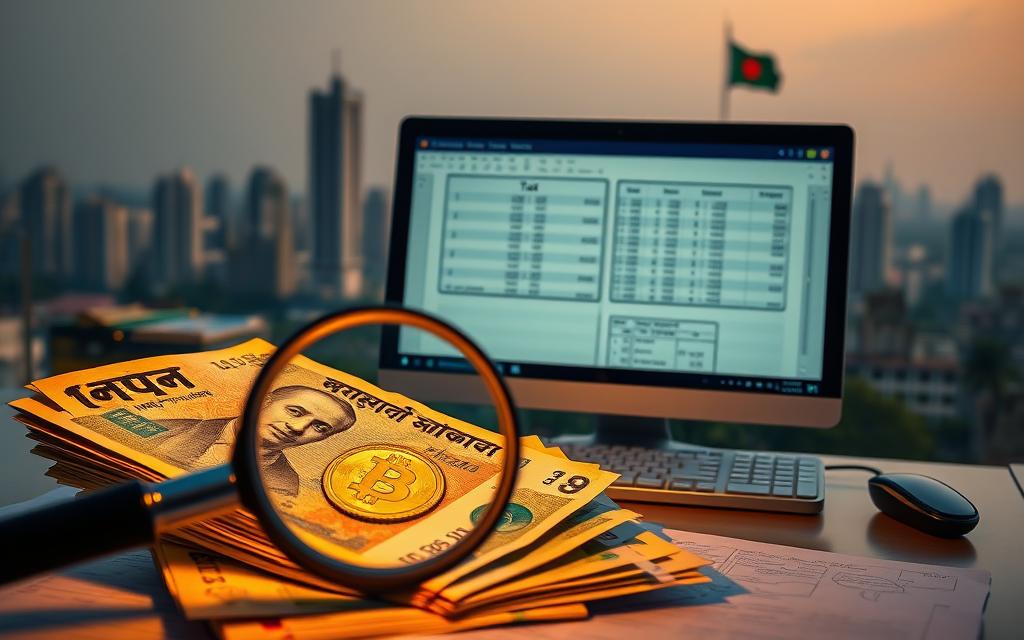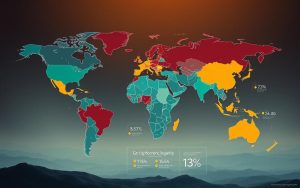Table of Contents
Bangladesh presents a unique paradox in the world of digital assets. While the Bangladesh government restricts trading, millions still engage with cryptocurrencies. Over 4.3 million people own these decentralized currencies despite legal barriers.
The country ranks 35th globally in adoption, according to Chainalysis. This growth persists even with strict financial regulations. Authorities maintain conflicting stances—embracing blockchain technology while banning crypto transactions.
This article explores the complex landscape. We’ll examine legal frameworks, tax implications, and practical realities. Discover how regulatory challenges coexist with increasing public interest in alternative financial systems.
1. Introduction: Cryptocurrency in Bangladesh
The 2020 National Blockchain Strategy highlights Bangladesh’s cautious embrace of blockchain technology. While promoting innovation, authorities maintain a ban on cryptocurrencies, creating a complex landscape for digital assets.
Historically, Bangladesh’s financial sector leaned on traditional banking. Mobile money services like bKash paved the way for digital finance. Yet, crypto remains in a regulatory gray zone despite public interest.
The blockchain strategy aims to modernize governance and supply chains. It avoids endorsing decentralized currencies, focusing instead on enterprise solutions. This duality reflects global debates about balancing innovation with control.
Demographics fuel adoption Bangladesh can’t ignore. Over 63% of the population is under 35, with 85% smartphone penetration. Tech-savvy youth drive demand for alternative investments, even amid restrictions.
“Remittances account for 6% of GDP. Cryptocurrencies could streamline $21.6B in annual transfers, but regulatory hurdles persist.”
Ownership statistics reveal the paradox. Chainalysis ranks Bangladesh 35th globally for cryptocurrencies usage. Peer-to-peer trading thrives, proving bans rarely stop determined adopters.
The tension between policy and practice defines Bangladesh’s crypto journey. As the national blockchain strategy evolves, so does public appetite for decentralized finance.
2. Can a Bangladeshi National Hold Crypto? The Legal Status
Legal complexities shape digital asset ownership in Bangladesh. The Foreign Exchange Regulation Act 1947 explicitly bans cryptocurrencies as payment methods. Section 13(1) classifies them as unauthorized foreign transactions.

2.1 Bitcoin as Illegal Tender
Bangladesh Bank declared Bitcoin and similar assets remains illegal for transactions. Violations risk penalties under anti-money laundering laws. The 2019 Dhaka Cyber Tribunal reinforced this by ruling crypto trades unlawful.
“Possession isn’t criminalized, but transactional use violates FERA 1947.”
2.2 Offshore vs. Onshore Ownership
Local exchanges face ISP blocks, as seen with Binance in 2018. However, foreign exchange regulation act loopholes allow offshore broker access. Investors convert Taka to USD via approved channels to trade internationally.
The legal Bangladesh landscape contrasts possession with active trading. While wallets aren’t banned, converting crypto to fiat triggers scrutiny. This duality fuels peer-to-peer market growth despite restrictions.
3. The Legal Framework Governing Crypto in Bangladesh
Three major laws form the backbone of Bangladesh’s restrictive crypto framework. The Foreign Exchange Regulation Act 1947, Money Laundering Prevention Act 2012, and Anti-Terrorism Act 2009 create overlapping barriers. Violations risk severe penalties, including 12-year imprisonment.
3.1 Foreign Exchange Regulation Act 1947
Section 4 of FERA bans unauthorized foreign currency transactions. Crypto trades fall under this exchange regulation act as cross-border payments. Bangladesh Bank classifies digital assets as “non-approved” currencies.
Recent enforcement targeted peer-to-peer platforms. In 2023, authorities froze accounts linked to Binance transactions. Penalties include fines up to 200% of the illicit amount.
3.2 Money Laundering Prevention Act 2012
The money laundering prevention act mandates reporting for suspicious crypto activity. Financial Intelligence Unit (FIU) monitors wallet addresses. Non-compliance risks 4-12 years imprisonment.
“MLA 2012 treats unverified crypto transfers as potential money laundering.”
3.3 Anti-Terrorism Act 2009
ATA’s Section 6(2) criminalizes funding terrorism via digital assets. Cross-border transfers require Bangladesh Bank approval. Violators face asset seizures and travel bans.
| Law | Relevant Section | Maximum Penalty |
|---|---|---|
| FERA 1947 | Section 4 | 200% fine + account freeze |
| MLA 2012 | Section 15 | 12 years imprisonment |
| ATA 2009 | Section 6(2) | Asset forfeiture + travel ban |
Jurisdictional conflicts complicate enforcement. Bangladesh Bank, FIU, and BSEC all claim oversight. This ambiguity fuels regulatory uncertainty despite strict rules.
4. Bangladesh Bank’s Stance on Cryptocurrencies

Bangladesh Bank maintains a firm position against decentralized currencies while exploring digital alternatives. Its 2017 ban on crypto transactions contrasts with 2024 discussions about a central bank digital currency (CBDC). This duality reflects cautious innovation in the financial institutions sector.
A 2019 circular prohibited banks from processing legal tender conversions for crypto trades. The 2023 notice escalated enforcement, warning against peer-to-peer platforms. Penalties reached $450,000 for non-compliance, targeting illicit forex transactions.
“SWIFT alerts now flag crypto-related transfers, requiring manual review by compliance teams.”
Strict regulations mandate enhanced KYC for USD conversions. Investors must declare sources of funds, delaying transactions by 3–5 business days. Offshore broker access remains possible but risks account freezes.
The proposed digital taka pilot, however, signals a shift. Unlike decentralized assets, this CBDC would operate under Bangladesh Bank control. Analysts note the irony: embracing blockchain while rejecting its most popular application.
Peer-to-peer market activity persists despite crackdowns. Authorities monitor platforms like LocalBitcoins, but encrypted wallets complicate enforcement. The gap between policy and practice grows as adoption climbs.
5. Tax Implications for Crypto Transactions
Navigating tax obligations for digital assets requires careful attention in Bangladesh. The National Board of Revenue (NBR) classifies cryptocurrencies as property under the Income Tax Ordinance 1984. This triggers multiple liabilities, from capital gains to value-added taxes.

5.1 Capital Gains Tax
Profits from trading digital assets face a 15% capital gains tax. For example, selling Bitcoin for a $10,000 profit incurs a $1,500 liability. The NBR tracks conversions via banking KYC data.
“Offshore transactions exceeding $5,000 must be reported within 30 days under 2024 NBR guidelines.”
5.2 Income Tax on Mining and Staking
Mining rewards qualify as taxable income, subject to progressive rates up to 25%. Equipment depreciation deductions apply under Section 29 of the tax code. Staking yields follow similar income tax rules.
5.3 VAT and Other Potential Taxes
Converting crypto to fiat may attract 15% VAT if deemed a service. Peer-to-peer trades often escape scrutiny, but formal exchanges face audits. The NBR increasingly targets offshore platforms.
- Tax treatment: Property classification under Section 19(13).
- Reporting: Annual filings must disclose crypto holdings.
- Enforcement: FIU monitors wallet-to-bank transfers.
6. How Bangladeshi Nationals Can Trade Crypto Legally
Innovative methods enable digital asset trading within Bangladesh’s strict financial framework. While local exchange platforms remain blocked, investors utilize international brokers and currency conversion strategies. These approaches comply with foreign regulations while accessing global markets.

6.1 Using Offshore Brokers
Platforms like eToro and Bybit serve Bangladeshi traders through USD-denominated accounts. These offshore brokers avoid local restrictions by processing transactions in foreign currency. Users must complete identity verification matching their bank records.
Contracts for Difference (CFD) platforms offer advantages for regulatory compliance. Unlike direct purchases, CFDs track asset prices without requiring wallet transfers. Physical trading alternatives exist but involve complex withdrawal procedures.
6.2 Converting Taka to USD
Authorized dealers like Sonali Bank facilitate Bangladeshi taka to USD conversions for international transfers. Investors submit proof of income and travel documents for transactions exceeding $5,000. The process typically takes 3-5 business days for approval.
“Islamic finance-compliant accounts eliminate swap fees for Sharia-adherent traders, gaining popularity since 2022.”
Withdrawals require reverse conversion through the same banking channel. Some platforms offer peer-to-peer USD settlements, though these carry higher regulatory risks. VPN usage remains common but violates most brokers’ terms of service.
7. Challenges to Crypto Adoption in Bangladesh
Systemic barriers continue to hinder mainstream cryptocurrency acceptance nationwide. Despite growing interest, regulations and technical restrictions create a complex environment for digital asset activities. Recent enforcement measures amplify difficulties for both casual users and professional traders.
7.1 Regulatory Uncertainty
The 2024 BFIU monitoring system tracks wallet-to-bank transfers in real-time. Over 86% of users report frozen accounts when attempting conversions to market currencies. Authorities flag transactions exceeding $500 monthly without documented income sources.
“Monthly USD conversion limits dropped 60% since 2022, capping at $500 for personal accounts.”
Hardware wallet imports now require special approval from the Bangladesh Telecommunication Regulatory Commission. Customs officials seized 412 Ledger and Trezor devices in Q1 2024 alone.
7.2 Blocked Trading Platforms
Internet service providers expanded blacklists to 38 market platforms this year. The LocalBitcoins shutdown in 2023 demonstrated enforcement priorities, with 12 traders facing MLA 2012 charges.
- Banking restrictions: Mandatory explanations for USD conversions under anti-money laundering rules
- OTC risks: Three prosecutions for peer-to-peer trades exceeding 50,000 BDT monthly
- Technical barriers: Deep packet inspection targets VPN traffic to foreign exchanges
These challenges create operational bottlenecks despite the country’s high adoption ranking. The disconnect between policy and practice forces investors to navigate a constantly shifting landscape.
8. Why Crypto Adoption Is Growing Despite Restrictions
Youth-driven demand fuels cryptocurrency growth even under regulatory pressure. Over 63% of the country’s population falls within the 18-35 age bracket, creating natural tech adoption momentum. Smartphone penetration exceeds 85%, enabling easy access to digital asset activities.
Peer-to-peer trading volumes surged 214% between 2022-2024, according to market analysts. The ready-made garment sector drives cross-border transactions, with crypto simplifying international payments. Remittance use cases grew 300% as workers bypass traditional transfer fees.
Economic pressures accelerate adoption. With inflation hitting 9.5%, many view digital assets as inflation hedges. Monthly salaries lose purchasing power faster than crypto appreciations in dollar terms. This practical reality outweighs regulatory warnings for most users.
Universities shape the future landscape through blockchain education. Dhaka University’s FinTech Society hosts regular workshops on decentralized finance. Similar clubs exist in 23 institutions, creating informed next-generation investors.
The market adapts creatively to restrictions. Dark web transactions remain minimal compared to legitimate activities. Most users prefer established platforms through VPNs rather than illicit channels. This demonstrates responsible adoption patterns despite legal gray areas.
Looking ahead, the country’s tech-savvy population will likely push for clearer regulations. As blockchain education spreads, pressure mounts for a balanced approach. The future may see Bangladesh harmonizing innovation with oversight.
9. The Future of Cryptocurrency in Bangladesh
Bangladesh’s financial landscape stands at a crossroads regarding decentralized currencies. The 2025 digital taka pilot signals Bangladesh Bank‘s cautious approach to blockchain adoption. This central bank digital currency (CBDC) will operate under strict oversight, contrasting with current regulations against private digital assets.
Draft provisions in the Digital Security Act 2025 reveal potential reforms. The legislation may introduce licensing for compliant exchanges while maintaining bans on anonymous trading. National blockchain strategy documents suggest tiered approval processes for institutional users.
“Phase one CBDC testing begins Q2 2025 with limited merchant participation,” confirms a Bangladesh Bank fintech report.
Banking sector adoption accelerates behind the scenes. Six major lenders now use private blockchains for cross-border settlements. This institutional embrace could pave the way for broader digital assets integration post-2026.
The future remains uncertain but leans toward controlled innovation. IMF negotiations may push for FATF-compliant frameworks, potentially legitimizing some crypto activities. For now, the tension between prohibition and technological progress defines Bangladesh’s path forward.
10. Conclusion
Navigating crypto regulations in Bangladesh requires balancing legal risks with market opportunities. The government maintains strict bans, yet peer-to-peer trading thrives through creative solutions.
Key considerations include tax reporting for digital assets and using compliant offshore platforms. While penalties exist for unauthorized transactions, possession remains in a gray area.
Future adoption depends on evolving policies. The proposed digital taka could shift perspectives on blockchain technology. For now, investors must prioritize security and compliance.
Resources like encrypted wallets and licensed tax advisors help mitigate risks. Stay informed as legal Bangladesh frameworks adapt to global financial trends.
FAQ
Is cryptocurrency legal in Bangladesh?
No, cryptocurrencies like Bitcoin remain illegal under Bangladesh’s financial regulations. The Bangladesh Bank prohibits transactions involving digital assets.
Can individuals trade crypto using offshore brokers?
While local trading is banned, some use offshore brokers by converting Bangladeshi Taka to USD. However, this carries legal risks under the Foreign Exchange Regulation Act.
Are crypto transactions taxable in Bangladesh?
Since crypto is illegal, there are no formal tax rules. However, if detected, authorities may impose penalties under anti-money laundering laws.
What laws restrict cryptocurrency use?
The Foreign Exchange Regulation Act 1947, Money Laundering Prevention Act 2012, and Anti-Terrorism Act 2009 all discourage crypto activities.
Why is crypto adoption growing despite bans?
Demand for decentralized finance and peer-to-peer transactions drives adoption. Some bypass restrictions using VPNs or foreign payment methods.
Does Bangladesh have a national blockchain strategy?
No official strategy exists yet. The government focuses on curbing crypto rather than exploring blockchain applications.
Can miners operate legally in Bangladesh?
No. Mining falls under unauthorized financial activities, risking penalties under existing regulations.









